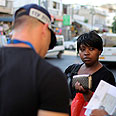
Immigration policy, now
Op-ed: Being only Western democracy lacking an immigration policy, Israel needs one urgently
During the last weeks Israeli society has suddenly awakened to the issue of immigration. After angry demonstrations in south Tel Aviv, accompanied by intermittent episodes of violence, the situation has quickly received broad public attention and reached the front pages of newspapers. Meanwhile, public officials issued racist statements against immigrants and Interior Minister Eli Yishai called for the expulsion of all African immigrants. Consequently, the Ministry of Interior has developed a new strategy of deportation and confinement in the Negev for African migrants.
This rushed and approximate policy will not solve the complex issue of immigration in Israel. Rather, it advances an unprofessional, inhumane, and only temporary solution.
The immigrant population in Israel is a very heterogeneous group composed of international immigrant workers, African asylum seekers and Palestinians seeking family reunification. According to experts, the phenomenon has reached the sizable proportion of 400,000 labor immigrants, 100,000 beneficiaries of family reunification and 60,000 asylum seekers. Yet Israel remains the only Western democracy lacking an immigration policy.
In fact, aside from the Law of Return of 1950 which refers exclusively to Jewish immigrants, Israel still lacks a proper legal framework that can regulate foreign immigration. With today's reality of global migration, this legal vacuum represents a dangerous flaw that prevents the State from effectively coping with the problem while respecting international, legal and humane standards. This serious flaw is best reflected by the chaotic atmosphere over the past weeks, where fear, racism and violence have bypassed law, order and humanity.
In 2010, acknowledging the danger of this legislative default, a group of scholars – Prof. Shlomo Avineri, Mr. Liav Orgad and Prof. Amnon Rubinstein – drafted a comprehensive proposal of legislative guidelines to regulate foreign immigration into Israel. The report, sponsored by the Metzilah Center, inserts Israel in an international context while acknowledging the peculiar characteristics of the Jewish state.
The recommendations of the report rely on the underlying principle of “Hard Outside/Soft Inside” which envisions the adoption of very restricted entry policies, contrasted with extensive rights and benefits to those who have been selectively let in. The recommendations further suggest diverse policies for the different categories of immigrants knocking at Israel's door and offer some unique guidelines that rightly separate between labor immigrants and asylum seekers.
Set up immigration authority
Labor immigration in Israel is nothing new. Working immigrants have been flooding Israel since the 1990s, with some deliberately brought as temporary workers, and others who entered as illegal immigrants. As in other countries that experience the same phenomenon, many of them end up staying, alimenting Israeli dependency on foreign labor in sectors such as construction, agriculture and elderly care.Nowadays workers from Thailand, the Philippines, the former Soviet Union, China and other countries are often in a legal grey area, and do not enjoy basic rights. For this category of immigrants, the Metzilah Center's report proposes several measures, often drawing on the blueprint of European States struggling with similar problems.
First of all, the illegal migrant population should be downsized considerably, by toughening border controls, building physical barriers and punishing illegal workers and their employers. Moreover, international cooperation with other countries should be established to prevent illegal immigration. However, all of these measures should come in the framework of full labor rights and legal protection for those who legally work in the country.
Regarding asylum seekers, Israel is bound by international law, having signed and ratified the 1951 Geneva Convention Relating to the Status of Refugees; yet it still lacks the requisite national legislation regarding the legal status of refugees and their rights. Hence, the situation of asylum seekers – mainly coming from African countries - is managed by non-governmental organizations, and the State does not grant them the basic rights they are entitled to. As a result, only a minuscule number have been granted refugee status.
For asylum seekers, the Metzilah report proposes incorporation of the international conventions into internal law, as a first step. Furthermore, quotas exceeding the United Nations High Commissioner for Refugees (UNHCR) requirements should be established in order to limit the influx; a special and professional authority for immigration affairs, which is missing so far, should be established and manage the requests for asylum; finally, Israel should reach bilateral agreements with other countries in order to deal with the issue, and a list of “safe countries”, whose citizens are not eligible to refugee status, should be compiled by the competent authority.
At a time when the issue of immigration has become of the highest national concern and is only likely to grow exponentially, the moment has arrived for Israel to finally adopt a proper immigration policy. Recent strategies advanced by Interior Minister Eli Yishai are not only inhumane, but also very unlikely to resolve the problems of illegal immigration. Reflecting the current policy's futility, just as the Population and Immigration Authority recently expelled 400 South Sudanese, another 400 immigrants have entered Israel from Egypt.
Ultimately, these all-inclusive strategies fail to recognize the difference between labor immigrants and refugees entitled to protection. On the other hand, the Metzilah report offers a thorough plan that carefully considers both State interests as well as immigrants' rights. The government should seriously consider these guidelines as, in the words of the authors of the report: “the perpetration of this state of affairs is injuring vital state interests and causing mistreatment of aliens that puts us to shame as a people and as a state.”










